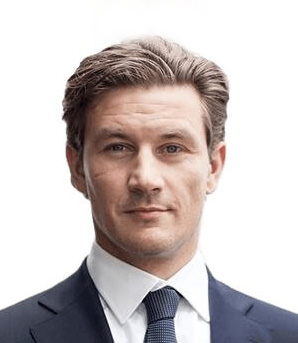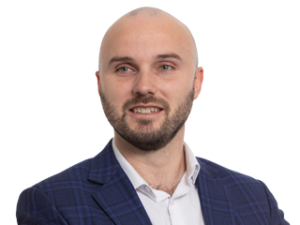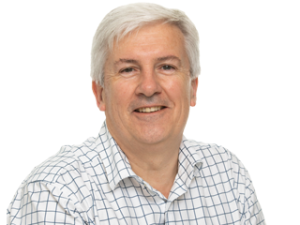
11min read
A catch-up with…Ed McDermott
“Gatekeeper to the markets.”

Ed McDermott
CEO of SEED Innovations Ltd
Typically, founders and leaders of companies in the cannabis sector have had some kind of “come to Jesus” moment, usually resulting from a family illness or following some teenage recreational experimentation, that opens their eyes to the potential of the plant. That’s not the case for Ed McDermott. His interest in the sector was awakened while working in corporate finance in the USA. His experience of the North American cannabis market drives his conviction in the opportunities offered by the industry. When he took the helm at SEED, he applied that belief to the company’s investment strategy. This year it has turned a corner with more cannabis companies in its portfolio than any other type of investment – a significant step towards the goal of becoming a focused cannabis fund.
“It was very obvious to me that there is great demand for cannabis products,” says Ed. “Frequently in America, I would see a cannabis dispensary on one side of the street with a queue out the door, and an off-license on the other with nobody in it,” says Ed. “People want to be able to use cannabis products in a legal setting without feeling like criminals, whether that be medicinal, recreational, or over the counter Cannabidiol (CBD) products.”
SEED is a Venture Capital fund based in Guernsey with an international portfolio including technology, biotech, blockchain and increasingly, a focus on the cannabinoid wellness and medical cannabis markets. It is also the only AIM-listed investment company with direct exposure to pharmaceutical and medical cannabis.
When Ed joined in 2018, he started the process of re-focussing investments away from a broad blend of legacy assets towards areas where the SEED team had real experience, namely highly regulated industries and the cannabis sector in particular.
The team has a unique set of experience as some of the earliest investors in the legal cannabis market. A former investment banker, Ed has been a founder and operator of a cannabis company that sold for one of the highest valuations of any European company: EMMAC Life Sciences was sold to Canadian listed company, Curaleaf International in a deal worth over $400m. Prior to that he was a very early stage investor in NuVera Health which sold to Aphria Inc., for $800m.
“Collectively, across the cannabis space, two companies originated and founded by people within the SEED management team have gone on to sell for over $1bn. We’ve been on the ground in multiple territories, including eight different territories across Europe, and have the best track record of any cannabis investment fund out there,” explains Ed. “We really understand the market.” This industry experience enables him to quickly spot poor companies, he says: “Any novel market is fraught with chancers. We very, very quickly smell the rats.”
Since new FCA guidance was published last year permitting cannabis companies to list, a small number have listed on the main London market and more are in the pipeline. “We saw an opportunity to make a quick return on our investments in a couple of the companies that have listed due to the excitement in the market,” says Ed, “but that’s not our preferred approach. We are seeing a lot of companies struggling to raise money privately, going public as a panacea, but listing won’t solve these problems, it will create a whole bunch of new ones,” he explains.
“Some companies think they’ll be able to spook the market into giving them a really high valuation and while that may have happened, management teams need to be a little less greedy and align their success with up-side, rather than just be paid for doing something logical and simple. Management teams need to start being a bit more realistic,” he adds.
While Ed acknowledges that the market is very difficult, highly regulated, and fast-growing, he says it is not growing anywhere near fast enough to justify multi-million pound valuations based on only half a million of revenue: “It’s just not acceptable. We’d rather build a company to a more robust, double-digit millions position before taking it to a listing. It’s in the industry and the investors’ interest that companies take their time, learn how to operate properly and find a way to raise money privately before going to a listing,” he says.
According to Ed, there are some good companies coming through in both the UK and, particularly, Germany: “I think next year we’ll see a number of potential listings from that geography,” he predicts. “The UK also has some good companies that are getting close to double-digit millions, but it’s a very competitive market, made all the more difficult in the medicinal cannabis market by having a Schedule 2 product that you can’t market to people. There’s a lot of hype around some of the CBD wellness product companies, but there’s a small percentage that look promising, if they can get their valuations to a sensible level and make sure that investors make money out of them,” he says.
“My concern, as a massive proponent of this market, is that bad companies come to market, ill-prepared, poorly managed, and that burn investors’ capital. Those investors won’t come back,” he adds. “I see myself as a bit of a gatekeeper to the market because I think that the protection of investors is critical. We want to make sure that investors don’t get burned because we believe in the sector over the next two, five and ten years. It’s going to be one of significant growth – if it’s done well.”
They celebrate capitalism far more than we do, too, according to Ed, whereas in the UK investor behaviour is a lot more conservative: “There’s a reason why there are countless companies on Nasdaq with multiple billion dollar market caps that nobody has ever heard of. In the UK, if a company reaches that level, it’s a household name!” Ed believes there is also a clear attitude difference: “In the UK, we’re a lot less blue-sky focussed: we want to know exactly what the numbers are, we want to know exactly what the trajectory is. The US seems to celebrate innovation more than we do in the UK.”
Canada and the UK have their differences, too, but are more closely aligned. “The UK is where Canada was back in 2015!” says Ed. “People forget that Canada and the US started medical cannabis programmes many, many years ago, that only became globally recognised in the last three or four years. We’re still a bit behind them and we have a different attitude socially and corporately which is going to keep us moving at a slightly slower pace, but there are learnings we can take from North America.”
Investors haven’t had a lot of choice of companies to invest in so far in the UK, says Ed: “Hopefully we see a good number of offerings of sensible companies that offer a good spectrum of verticals across the industry. Things are changing very positively but it will take time.”
“The UK is already a hub for medical cannabis. It is one of the largest markets in terms of number of active patients and there is a 30 to 70 percent month on month compound growth in prescription numbers, which is a nice, steady rate of growth,” he says, but there are still issues around access. “Patients can’t get products through their GPs, nor are products supported by the NHS – it’s a private market,” he explains. Ed believes positive change is still some way off: “For cannabis products to be seen as viable options will take real world evidence from patient studies, or full clinical trials for specific products,” he says.
“We’re doing well on the medical side,” says Ed, “but we haven’t really addressed a lot of the other potential verticals, such as hemp based businesses creating more industrial-use products like building materials, and clothes etc.”
“There are bubbles in the market, then things get sensible again, then there’s a catalyst and there are many, many catalysts yet to come that will take companies from an embryonic stage through to a Pfizer or Diageo. The market will really take-off once we start to see major brands in this space. But the business case has to work for the specific vertical market whether it is nutraceutical, pharmaceutical, CBD wellness brand or hemp-based products,” says Ed. “It’s very clear the direction the industry’s going to go, it’s just a case of operators doing the right thing and investors getting in at the right price.”
However, there are still some significant challenges. “It may be controversial, and not what people want to hear, but I think the industry often gets in its own way: it’s not outside forces making life difficult for the industry, its the industry itself,” says Ed. “One of those issues is greedy management teams after crazy returns on the often limited capital that they’ve put into the business,” he says.
“From a patient perspective, we as an industry need to make sure that products are top, consistent quality and make sure that they are as cheap as humanly possible. The only way to do that is to create a supply chain that has efficiencies and isn’t full of middlemen all trying to grasp their share. The sooner we can get rid of lots of middlemen and have more of a vertical strategy, the better,” says Ed. “Each vertical of the supply chain needs to do things the right way. For example, cultivation needs to be done in a cheap location that’s consistent and goes through all of the right quality controls.”
Other challenges include regulation: The UK regulatory framework is still evolving: “There are some more nuances within the regulatory framework which could do with shifting a bit,” says Ed, “but we are talking with policy makers and regulators all the time as well. They are open to suggestions and a lot of challenges are easy fixes, but it just takes more time than the industry-side would like.
All the makings are there for a really good industry, but the challenges will take time, according to Ed. “The onus is on us to prove to the regulators and policy makers that we are operating in the best way we can and that’s how we’ll gain trust from all the different parties that add-up to a significant industry,” he says.
Ed believes it’s really important that corporate advisers understand cannabis companies and the regulations that govern them, as much as possible. “I would encourage all advisors to really learn, in-depth, what a medical cannabis business looks like versus an over the counter CBD business,” he recommends. “In the gaming industry for example, you have banks, broking houses, firms of accountants and law firms that really specialise in the industry and that’s what we’d like to see, although we understand it takes time to build,” he explains.
“It’s all of our job to make sure that investors are as well placed as they possibly can be in this industry, because if we’re not able to deliver returns because we don’t totally understand it, and we let poor companies onto the market because we haven’t spotted things that we should have, that’s on us,” says Ed. “We as an industry, collectively as financiers, as lawyers, as accountants, we all have a responsibility to make sure that these companies are fit for purpose and will stand the test of time.”

























